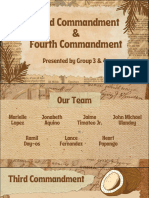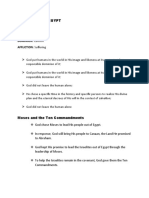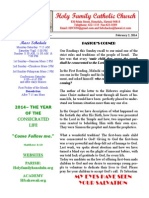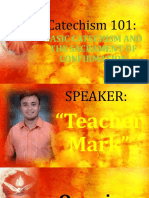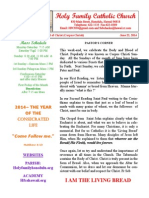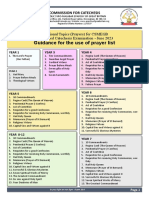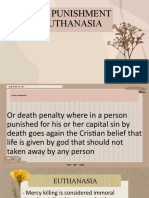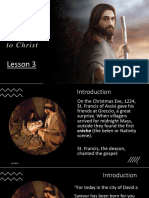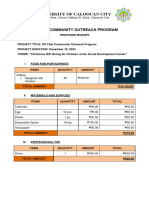0 ratings0% found this document useful (0 votes)
119 views24 pagesArticle 3: The Third Commandment
The document discusses the third commandment to keep holy the Lord's day, which is Sunday. It explains that Sunday fulfills the spiritual truth of the Jewish Sabbath by commemorating Christ's resurrection. The document outlines the Church's holy days of obligation, including Sunday and various religious feast days. It states that the faithful are obliged to attend Mass on Sundays and holy days, and discusses exceptions to this obligation.
Uploaded by
Sherjohn tombocCopyright
© © All Rights Reserved
We take content rights seriously. If you suspect this is your content, claim it here.
Available Formats
Download as DOCX, PDF, TXT or read online on Scribd
0 ratings0% found this document useful (0 votes)
119 views24 pagesArticle 3: The Third Commandment
The document discusses the third commandment to keep holy the Lord's day, which is Sunday. It explains that Sunday fulfills the spiritual truth of the Jewish Sabbath by commemorating Christ's resurrection. The document outlines the Church's holy days of obligation, including Sunday and various religious feast days. It states that the faithful are obliged to attend Mass on Sundays and holy days, and discusses exceptions to this obligation.
Uploaded by
Sherjohn tombocCopyright
© © All Rights Reserved
We take content rights seriously. If you suspect this is your content, claim it here.
Available Formats
Download as DOCX, PDF, TXT or read online on Scribd
You are on page 1/ 24
Article 3: The Third Commandment
Questions and Answers
1. What is the third commandment? (CCC 2168)
The third commandment is: “Remember to keep holy the Lord’s Day.”
2. What is the origin of the Sabbath day? (CCC 2169)
The origin of the Sabbath day is the time of creation when God, after having
made the world, rested the seventh day and blessed and hallowed it.
2226. What three facts does the Sabbath day recall? (CCC 2169-2171)The Sabbath
day recalls:
1. the creation of the world
2. the liberation from Egypt
3. the irrevocable covenant.
2227. Why is the Sabbath the model for human action? (CCC 2172)The Sabbath is the
model for human action, because it teaches man to rest so that God can act in him.
2228. How does Christ give the definite explanation of the Sabbath? (CCC 2173)Christ
gives the definite explanation of the Sabbath by saying: “The Sabbath was made for
man, not man for the Sabbath” (Mk 2).
2229. What day of the week is the Lord’s Day? (CCC 2174)The Sunday, first day of the
week, is the Lord’s Day.
2230. Why is the first day of the week the Lord’s Day? (CCC 2174)The first day of the
week is the Lord’s Day, because it is the day of Christ’s Resurrection.
2231. Why is the Sabbath replaced by the Sunday? (CCC 2175)The Sabbath is
replaced by the Sunday, because the Sunday as the day of Christ’s Resurrection fulfils
the spiritual truth of the Jewish Sabbath and announces man’s eternal rest in God.
2232. What is the foremost holy day of obligation in the universal Church? (CCC
2177)The foremost holy day of obligation in the universal Church is the Sunday.
2233. What are the Church’s ten holy days of obligation? (CCC 2177)The Church’s ten
holy days of obligation are:
1. Christmas
2. Epiphany
3. Ascension
4. Corpus Christi
5. the feast of the Mother of God on January 1
6. Immaculate Conception
7. Assumption
8. the feast of St Joseph
9. the feast of the apostles Peter and Paul
10. All Saints.
2234. Why can we not pray at home as at church according to St John Chrysostom?
(CCC 2179)According to St John Chrysostom (around AD 400), we cannot pray at
home as at church, because in the church we find:
1. a great multitude that cries out to God as from one great heart
2. the union of minds
3. the accord of souls
4. the bond of charity
5. the prayers of the priest.
2235. On what days are the faithful bound to attend Mass? (CCC 2180)The faithful are
bound to attend Mass on Sundays and other holy days of obligation.
2236. How is the obligation to attend Mass satisfied? (CCC 2180)The obligation to
attend Mass is satisfied by assistance at a Mass which is celebrated anywhere in a
Catholic rite either on the holy day or on the evening of the preceding day.
2237. When are the faithful excused from attending Mass on days of obligation? (CCC
2181)The faithful are excused from attending Mass on days of obligation in the case of:
1. a serious reason
2. dispensation by their own pastor.
A serious reason is e.g. illness, the care of infants or when no Mass is available.
2238. What kind of sin is the deliberate failure to attend Mass on days of obligation?
(CCC 2181)The deliberate failure to attend Mass on days of obligation is a grave sin.
2239. What may the faithful do if Sunday Mass is not available? (CCC 2183)If Sunday
Mass is not available the faithful may:
1. take part in the Liturgy of the Word if it is celebrated or
2. engage in prayer for an appropriate amount of time personally or in groups.
2240. What activities must be avoided on Sundays and other holy days of obligation?
(CCC 2185)The activities that must be avoided on Sundays and other holy days of
obligation are those that hinder:
1. the worship owed to God
2. the joy proper to the Lord’s Day
3. the performance of the works of mercy
4. the appropriate relaxation of mind and body.
2241. Why should Sundays and holy days of obligation be legal holidays? (CCC
2188)Sundays and holy days of obligation should be legal holidays, because they are a
precious contribution to the spiritual life of society.
Questions and Answers
2250. What is the fourth commandment? (CCC 2197)The fourth commandment is:
“Honour your father and your mother.”
2251. How does the fourth commandment show the order of charity? (CCC 2197)The
fourth commandment shows the order of charity by indicating that the love of God is
followed by the love of one’s parents.
2252. To whom is the fourth commandment addressed expressly? (CCC 2199)The
fourth commandment is addressed expressly to children in their relationship to their
parents.
2253. What relationships does the fourth commandment regard in a larger sense?
(CCC 2199)The relationships that the fourth commandment regards in a larger sense
are:
1. the ties of kinship between members of the extended family
2. the duties of pupils to teachers
3. the duties of employees to employers
4. the duties of subordinates to leaders
5. the duties of citizens to their country and its authorities.
2254. What is the reward promised for observing the fourth commandment? (CCC
2200)The reward promised for observing the fourth commandment is “that your days
may be long in the land which the Lord your God gives you.”
2255. Upon what is the family established by the spouses? (CCC 2201)The family is
established upon the covenant and consent of the spouses.
2256. To what two ends are marriage and family ordered? (CCC 2201)Marriage and
family are ordered to:
1. the good of the spouses
2. the procreation and education of children.
2257. What is a family? (CCC 2202)A family is a man and a woman united in marriage,
together with their children.
2258. When did God institute the family? (CCC 2203)God instituted the family when He
created man and woman.
2259. Why can the Christian family be called a domestic church? (CCC 2204)The
Christian family can be called a domestic church, because it constitutes a specific
revelation and realization of ecclesial communion.
2260. How does the Christian family reflect the Father’s work of creation? (CCC
2205)The Christian family reflects the Father’s work of creation in the procreation and
education of children.
2261. How are family and society related? (CCC 2207)Family and society are related by
the fact that the family is the original cell of society.
2262. What is the duty of the civil authority regarding the family? (CCC 2210)The duty
of the civil authority regarding the family is:
1. to acknowledge, protect and foster the true nature of marriage and the family
2. to safeguard public morality
3. to promote domestic prosperity.
2263. How are the duties of family members classified? (CCC 2214-2231)The duties of
family members are classified as:
1. the duties of children
2. the duties of parents.
2264. What is the most fundamental reason for the honour owed to parents? (CCC
2214)The most fundamental reason for the honour owed to parents is the fact that the
human fatherhood has the Divine Fatherhood as its source.
2265. What is filial piety? (CCC 2215)Filial piety is the respect of the children for their
parents.
2266. How is filial respect shown? (CCC 2216)Filial respect is shown by true docility
and obedience.
2267. What are the responsibilities of grown children toward their parents? (CCC
2218)The responsibilities of grown children toward their parents are to give them
material and moral support in old age and in times of illness, loneliness or distress.
2268. What is the primordial duty of the parents toward their children? (CCC 2221)The
primordial duty of the parents toward their children is to educate them.
2269. What are the two aspects of the fecundity of conjugal love? (CCC 2221)The two
aspects of the fecundity of conjugal love are:
1. the procreation of children
2. the moral education and spiritual formation of the children.
2270. Who has the first responsibility for the education of children? (CCC 2223)Parents
have the first responsibility for the education of their children.
2271. When should parents start associating their children with the life of the Church?
(CCC 2225)Parents should start associating their children with the life of the Church
from their tenderest years.
2272. How do children contribute to the spiritual benefit of their parents? (CCC
2227)Children contribute to the spiritual benefit of their parents by making them grow in
holiness.
2273. What school should parents choose for their children? (CCC 2229)Parents should
choose a school for their children that best helps them in their task as Christian
educators.
2274. Why does the Kingdom of God have precedence over family ties? (CCC
2232)The Kingdom of God has precedence over family ties, because the first vocation
of the Christian is to follow Christ.
2275. How does Christ declare the precedence of the Kingdom of God over the family?
(CCC 2232)Christ declares the precedence of the Kingdom of God over the family by
saying: “He who loves father or mother more than me is not worthy of me; and he who
loves son or daughter more than me is not worthy of me” (Mt 10).
2276. How does the fourth commandment regulate the authorities in civil society? (CCC
2234)The fourth commandment regulates the authorities in civil society by clarifying the
duties of those who exercise authority.
2277. How is the exercise of authority morally regulated? (CCC 2235)The exercise of
authority is morally regulated by:
1. its divine origin
2. its reasonable nature
3. its specific object.
2278. In what limits must civil authority be exercised? (CCC 2235)Civil authority must
be exercised in the limits of the dignity of persons and the natural law.
2279. What kind of justice must those in authority practice? (CCC 2236)Those in
authority must practice distributive justice.
Distributive justice regulates the behaviour of the whole toward the parts.
2280. How should those subject to authority regard those in authority? (CCC
2238)Those subject to authority should regard those in authority as representatives of
God.
2281. What is the aim of right criticisms of the ruling authorities? (CCC 2238)The aim of
right criticisms of the ruling authorities is to expose what seems harmful to the dignity of
persons and to the good of the community.
2282. What are our chief duties as citizens? (CCC 2239)Our chief duties as citizens are:
1. to contribute to the common good
2. to love and serve our country
3. to submit to legitimate authorities.
2283. Why is it morally obligatory to pay taxes, to vote and to defend one’s country?
(CCC 2240)It is morally obligatory to pay taxes, to vote and to defend one’s country,
because this follows from the duties of citizens to submit to authority and to contribute to
the good of society.
2284. When is a citizen obliged not to follow the directives of civil authorities? (CCC
2242)A citizen is obliged not to follow the directives of civil authorities when they are
contrary to:
1. the demands of the moral order
2. the fundamental rights of persons or
3. the teachings of the Gospel.
2285. Where does refusing obedience to civil authorities find its justification? (CCC
2242)Refusing obedience to civil authorities finds its justification in the distinction
between serving God and serving the political community.
2286. When is armed resistance to oppression by political authority legitimate? (CCC
2243)Armed resistance to oppression by political authority is legitimate when five
conditions are met:
1. there is certain, grave and prolonged violation of fundamental rights
2. all other means of redress have been exhausted
3. the resistance will not provoke worse disorders
4. there is well-founded hope of success
5. it is impossible reasonably to foresee any better solution.
Questions and Answers
2298. What is the fifth commandment? (CCC 2258)The fifth commandment is: “You
shall not kill.”
2299. Why is human life sacred? (CCC 2258)Human life is sacred, because:
1. from its beginning it involves the creative action of God
2. it remains forever in a special relationship with the Creator, who is its sole end.
2300. When does respect for human life become an issue for the first time? (CCC
2259)Respect for human life becomes for the first time an issue in the account of Abel’s
murder by his brother Cain (Gen 4).
2301. What does blood signify in the Old Testament? (CCC 2260)In the Old Testament
blood signifies life.
2302. To what is the deliberate murder of an innocent gravely contrary? (CCC 2261)The
deliberate murder of an innocent is gravely contrary to:
1. the dignity of the human being
2. the golden rule
3. the holiness of the Creator.
The “golden rule” is written down in Mt 7:12 “In everything do to others as you would
have them do to you.”
2303. What does it mean that the law forbidding murder is universally valid? (CCC
2261)That the law forbidding murder is universally valid means that it obliges each and
everyone, always and everywhere.
2304. What does Christ add to the commandment “You shall not kill”? (CCC
2262)Christ adds to the commandment “You shall not kill”:
1. the proscription of anger, hatred and vengeance
2. the call to turn the other cheek and to love the enemy.
2305. What double effect can the legitimate act of self-defence have? (CCC 2263)The
legitimate act of self-defence can have the double effect of:
1. the intended preservation of one’s own life
2. the unintentional killing of the aggressor.
2306. Why is it legitimate to insist on respect for one’s own right to life? (CCC 2264)It is
legitimate to insist on respect for one’s own right to life, because love toward oneself
remains a fundamental principle of morality.
2307. For whom is legitimate defence a grave duty? (CCC 2265)Legitimate defence is a
grave duty for the one who is responsible for the lives of others.
The defence of the common good requires that an unjust aggressor be rendered unable
to cause harm.
2308. Why is the state allowed to punish proportionate to the gravity of an offence?
(CCC 2266)The state is allowed to punish proportionate to the gravity of an offence
because of its obligation to safeguard the common good.
2309. What is the primary aim of punishment? (CCC 2266)The primary aim of
punishment is to redress the disorder introduced by an offence.
2310. When is recourse to the death penalty legitimate? (CCC 2267)Recourse to the
death penalty is legitimate, if this is the only possible way of effectively defending
human lives against an unjust aggressor and of protecting the safety of persons.
2311. Why are cases requiring death penalty today rare, if not practically nonexistent?
(CCC 2267)Cases requiring death penalty are today very rare if not practically
nonexistent because of the possibilities that the state has for effectively preventing
crime without killing the one who has committed an offence.
2312. What is direct and intentional killing? (CCC 2268)Direct and intentional killing is
the deliberate and premeditated murder of an innocent.
2313. What is indirect and intentional killing? (CCC 2269)Indirect and intentional killing
is taking somebody’s life by:
1. exposing him to mortal danger without grave reason or
2. refusing assistance to a person in danger.
2314. What is unintentional killing? (CCC 2269)Unintentional killing is taking
somebody’s life without wanting to do so.
2315. From what moment on must human life be respected and protected absolutely?
(CCC 2270)Human life must be respected and protected absolutely from the moment of
conception.
2316. From what moment on must a human being be recognized as a person? (CCC
2270)A human being must be recognized as a person from the first moment of his
existence.
2317. What is direct abortion? (CCC 2271)Direct abortion is an abortion willed either as
an end or a means.
2318. How must direct abortion be qualified morally? (CCC 2271)Direct abortion must
morally be qualified as gravely contrary to the moral law.
2319. How does Gaudium et Spes 51 call abortion? (CCC 2271)Gaudium et Spes 51
calls abortion an abominable crime.
Gaudium et Spes is a Vatican II document, the Pastoral Constitution on the Church in
the Modern World.
2320. What ecclesiastical penalty does a person who procures an abortion incur? (CCC
2272)A person who procures an abortion incurs excommunication latae sententiae.
“latae sententiae” means that the excommunication enters into force by the very
commission of the offence.
2321. On what does every man’s right to life from conception until death depend? (CCC
2273)Every man’s right to life from conception until death depends on the very human
nature.
2322. Why does a state that allows abortion undermine its own legal foundations? (CCC
2273)A state that allows abortion undermines its own legal foundations, because
abortion denies the equality of all before the law, in particular of the more vulnerable.
2323. When is prenatal diagnosis morally licit? (CCC 2274)Prenatal diagnosis is morally
licit if it respects the life and integrity of the embryo and is directed toward its
safeguarding or healing as an individual and there is no thought of possibly inducing an
abortion on the basis of the results obtained.
2324. Is it licit to produce human embryos for exploitation as biological material? (CCC
2275)No, it is not licit and is immoral to produce human embryos for exploitation as
biological material.
2325. What is direct euthanasia? (CCC 2277)Direct euthanasia is the putting an end to
the lives of handicapped, sick or dying persons.
Direct euthanasia is morally unacceptable.
2326. What life-saving medical procedures may the doctor discontinue? (CCC
2278)The doctor may discontinue life-saving medical procedures that are burdensome,
dangerous, extraordinary or disproportionate to the expected outcome.
By discontinuing medical procedures one does not will to cause death; one’s inability to
impede it is merely accepted.
2327. When may painkillers be used which risk shortening the days of a patient? (CCC
2279)Painkillers which risk shortening the days of a patient may be used if death is not
willed as either an end or a means, but only foreseen and tolerated as inevitable.
2328. Why are we not allowed to dispose of our life? (CCC 2280)We are not allowed to
dispose of our life, because we are stewards, not owners, of the life God has entrusted
to us.
2329. Why is suicide objectively a grave sin? (CCC 2281)Suicide is objectively a grave
sin, because it is gravely contrary to:
1. the just love of self
2. the love of one’s neighbour with whom it unjustly breaks the ties
3. love for the living God.
2330. In what case can the responsibility of the one committing suicide be diminished?
(CCC 2282)The responsibility of the one committing suicide can be diminished in the
case of grave psychological disturbances, anguish or grave fear of hardship, suffering
or torture.
2331. What does the Church do for those who have taken their own lives? (CCC
2283)The Church prays for those who have taken their own lives.
2332. How can one classify the areas which respect for the dignity of persons
concerns? (CCC 2284-2301)One can classify the areas which respect for the dignity of
persons concerns as:
1. the souls of others
2. the human health
3. the person in scientific research
4. bodily integrity
5. the dead.
2333. What is scandal? (CCC 2284)Scandal is an attitude or behaviour which leads
another to do evil and thus damages virtue and integrity.
2334. When is there a grave scandal? (CCC 2285)There is a grave scandal when the
scandal is given by those who by nature or office are obliged to teach and educate
others.
2335. How should we take care of our life and physical health? (CCC 2288)We should
take reasonable care of our life and physical health, taking into account the needs of
others and the common good.
2336. Why does the virtue of temperance contribute to respect for health? (CCC
2290)The virtue of temperance contributes to respect for health, because it disposes us
to avoid every kind of excess: the abuse of food, alcohol, tobacco or medicine.
2337. Under what condition are science and technology precious resources? (CCC
2293)Science and technology are precious resources under the condition that they are
placed at the service of man and promote his integral development for the benefit of all.
2338. How must the claim of moral neutrality in scientific research be judged? (CCC
2294)The claim of moral neutrality in scientific research must be judged as an illusion.
2339. When is experimentation on human beings immoral? (CCC 2295)Experimentation
on human beings is immoral when it exposes the subject’s life or physical and
psychological integrity to disproportionate or avoidable risks.
2340. When are organ transplants morally acceptable? (CCC 2296)Organ transplants
are morally acceptable when the physical and psychological dangers and risks incurred
by the donor are proportionate to the good that is sought for the recipient.
2341. How is organ donation after death to be judged morally? (CCC 2296)Organ
donation after death is to be judged morally as a meritorious act that is to be
encouraged.
2342. When is organ donation after death morally not acceptable? (CCC 2296)Organ
donation after death is morally not acceptable when the donor or his proxy has not
given explicit consent.
2343. What are the crimes against the respect of bodily integrity? (CCC 2297)The
crimes against the respect of bodily integrity are:
1. kidnapping and hostage taking
2. terrorism
3. torture
4. amputations, mutilations and sterilizations which are not performed for strictly
therapeutic reasons.
2344. How is respect for the dying person shown? (CCC 2299)Respect for the dying
person is shown by:
1. the giving of care and attention
2. the prayers of relatives
3. provision of the last rites.
2345. How must the bodies of the dead be treated? (CCC 2300)The bodies of the dead
must be treated with respect and charity, in faith and hope of the Resurrection.
2346. Under what circumstances can autopsies be morally permitted? (CCC
2301)Autopsies can be morally permitted for legal inquests or scientific research.
2347. Under what condition does the Church permit cremation? (CCC 2301)The Church
permits cremation under the condition that it does not demonstrate a denial of faith in
the resurrection of the body.
2348. Why does the observation of the fifth commandment help in safeguarding peace?
(CCC 2302)The observation of the fifth commandment helps in safeguarding peace,
because it promotes peace of heart and denounces murderous anger and hatred as
immoral.
2349. What is anger? (CCC 2302)Anger is a desire for revenge.
2350. What is hatred? (CCC 2303)Hatred is to wish evil on somebody.
2351. How is peace defined according to St Augustine? (CCC 2304)According to
St Augustine († 430), peace is defined as the tranquillity of order.
2352. Why is earthly peace related to the peace of Christ? (CCC 2305)Earthly peace is
related to the peace of Christ, because it is the image and fruit of the peace of Christ.
2353. Why does the Church pray and act so that God may free us from war? (CCC
2307)The Church prays and acts so that God may free us from war because of the evils
and injustices that accompany all war.
2354. What are the four strict conditions for legitimate defence by military force? (CCC
2309)The four strict conditions for legitimate defence by military force are at one and the
same time:
1. the damage inflicted by the aggressor must be lasting, grave and certain
2. all other means of putting an end to it must have been shown to be impractical or
ineffective
3. there must be serious prospects of success
4. the use of arms must not produce evils and disorders graver than the evil to be
eliminated.
These are the elements that form the “just war” doctrine.
2355. When may the obligations necessary for national defence be imposed on
citizens? (CCC 2310)The obligations necessary for national defence may be imposed
on citizens only when the four strict conditions for legitimate defence subsist.
2356. Is the moral law valid during an armed conflict? (CCC 2312)Yes, the moral law is
valid during an armed conflict.
2357. What are war crimes? (CCC 2313)War crimes are actions deliberately contrary to
the law of nations and to its universal principles.
2358. Why does the arms race not ensure peace? (CCC 2315)The arms race does not
ensure peace, because instead of eliminating the causes of war, it risks aggravating
them.
2359. What are the causes of wars and threats to peace? (CCC 2317)The causes of
wars and threats to peace are injustice, excessive economic or social inequalities, envy,
distrust and pride raging among men and nations.
Questions and Answers
2373. What is the sixth commandment? (CCC 2331)The sixth commandment is: “You
shall not commit adultery.”
2374. What is the OT locus classicus for the creation of man as male and female?
(CCC 2331)The Old Testament locus classicus for the creation of man as male and
female is Gen 1:27.
2375. What aspects of the human person does sexuality affect? (CCC 2332)Sexuality
affects all aspects of the human person.
2376. Toward what is physical, moral and spiritual complementarity of man oriented?
(CCC 2333)Physical, moral and spiritual complementarity of man is oriented toward the
goods of marriage and the flourishing of family life.
2377. Why do man and woman have an equal personal dignity? (CCC 2334)Man and
woman have an equal personal dignity, because both were created in the image and
likeness of God.
2378. What realities does the sixth commandment encompass? (CCC 2336)The sixth
commandment encompasses the whole of human sexuality.
2379. What is chastity? (CCC 2337)Chastity is the successful integration of sexuality
within the person.
2380. How does sexuality become personal and truly human? (CCC 2337)Sexuality
becomes personal and truly human, when it is integrated into the relationship of one
person to another in marriage.
2381. What is self-mastery? (CCC 2339)Self-mastery is the ability of man to govern his
passions.
2382. Why is self-mastery important? (CCC 2339)Self-mastery is important, because by
governing his passions man finds peace.
2383. What are the five means for acquiring self-mastery? (CCC 2340)The five means
for acquiring self-mastery are:
1. self-knowledge
2. ascesis
3. obedience to God’s commandments
4. exercise of the moral virtues
5. prayer.
2384. Under which cardinal virtue does chastity come? (CCC 2341)Chastity comes
under the cardinal virtue of temperance, which seeks to permeate the passions and
appetites of the senses with reason.
2385. How is self-mastery acquired? (CCC 2342)Self-mastery is acquired through long
and exacting work and is never possessed once for all.
2386. Why does chastity involve a cultural effort? (CCC 2344)Chastity involves a
cultural effort, because there is an interdependence between personal betterment and
the improvement of society.
2387. What does it mean that chastity is a gift from God? (CCC 2345)That chastity is a
gift from God means that the Holy Spirit enables one whom the water of Baptism has
regenerated to imitate the purity of Christ.
2388. How does chastity influence behaviour toward one’s neighbour? (CCC
2346)Chastity influences behaviour toward one’s neighbour by turning the chaste
person into a witness of God’s fidelity and loving kindness.
2389. What are the three forms of the virtue of chastity according to St Ambrose? (CCC
2349)According to St Ambrose (before AD 400) the three forms of the virtue of chastity
are:
1. the chastity of spouses
2. the chastity of widows
3. the chastity of virgins.
2390. What kind of chastity must those engaged to marry live? (CCC 2350)Those
engaged to marry must live chastity in continence reserving for marriage the
expressions of affection that belong to married love.
2391. What are the most serious offences against chastity? (CCC 2351-2356)The most
serious offences against chastity are lust, masturbation, fornication, pornography,
prostitution, rape and homosexual practices.
2392. What is lust? (CCC 2351)Lust is either:
1. disordered desire for sexual pleasure or
2. inordinate enjoyment of sexual pleasure.
2393. When is sexual pleasure morally disordered? (CCC 2351)Sexual pleasure is
morally disordered when sought for itself, isolated from its procreative and unitive
purposes.
2394. What is masturbation? (CCC 2352)Masturbation is the deliberate stimulation of
the genital organs in order to derive sexual pleasure.
2395. Why is masturbation a grave sin? (CCC 2352)Masturbation is a grave sin,
because it is an intrinsically and gravely disordered action.
The deliberate use of the sexual faculty outside of marriage, for whatever purpose, is
essentially contrary to its purpose.
2396. What factors can lessen or even extenuate the moral culpability of masturbation?
(CCC 2352)The factors that can lessen or even extenuate the moral culpability of
masturbation are:
1. emotional immaturity
2. force of acquired habit
3. condition of anxiety
4. other psychological or social factors.
These four factors can lessen or even extenuate the moral culpability of any kind of sin
(CCC 1860).
2397. What is fornication? (CCC 2353)Fornication is carnal union between an
unmarried man and an unmarried woman.
2398. Why is fornication gravely contrary to the dignity of human sexuality? (CCC
2353)Fornication is gravely contrary to the dignity of human sexuality, because human
sexuality is naturally ordered to the good of the spouses and the generation and
education of children while fornication is not.
2399. What is pornography? (CCC 2354)Pornography is the removal of real or
simulated sexual acts from the intimacy of the partners, in order to display them
deliberately to third parties.
Pornography immerses all who are involved in the illusion of a fantasy world.
2400. How should the state deal with pornography? (CCC 2354)The state should deal
with pornography by preventing its production and distribution.
2401. Why is prostitution a grave sin? (CCC 2355)Prostitution is a grave sin, because it:
1. does injury to the dignity of the person who is active in it
2. reduces the person to an instrument of sexual pleasure
3. defiles the body, the temple of the Holy Spirit.
2402. What is rape? (CCC 2356)Rape is the forcible violation of the sexual intimacy of
another person.
2403. Why is rape a grave sin? (CCC 2356)Rape is a grave sin, because it:
1. does injury to justice and charity
2. deeply wounds the respect, freedom and physical and moral integrity of a person.
Graver still is the rape of children committed by parents or by educators.
2404. What is homosexuality? (CCC 2357)Homosexuality is an exclusive or
predominant sexual attraction toward persons of the same sex.
2405. How does the Bible value homosexual acts? (CCC 2357)The Bible values
homosexual acts as acts of grave depravity.
2406. Why are homosexual acts intrinsically disordered? (CCC 2357)Homosexual acts
are intrinsically disordered, because they:
1. are contrary to the natural law
2. close the sexual act to procreation
3. do not proceed from a genuine affective and sexual complementarity.
2407. How should people behave who are tempted to commit homosexual acts? (CCC
2358-2359)People who are tempted to commit homosexual acts should:
1. unite to the sacrifice of the Cross the difficulties arising from such temptations
2. live a life in chastity
3. foster the virtues of self-mastery
4. engage in disinterested friendship, prayer and a sacramental life
5. gradually and resolutely approach Christian perfection.
2408. How is the love of husband and wife called? (CCC 2360)The love of husband and
wife is called conjugal love.
2409. When only is sexuality realized in a truly human way? (CCC 2361)Sexuality is
realized in a truly human way only if it is an integral part of the love by which a man and
woman commit themselves totally to one another until death.
2410. How should the pleasure resulting from the generative function be enjoyed?
(CCC 2362)The pleasure resulting from the generative function should be enjoyed as
God’s gift in the limits of just moderation.
2411. What twofold end of marriage does the spouses’ union achieve? (CCC 2363)The
spouses’ union achieves:
1. the good of the spouses
2. the transmission of life.
The conjugal love of man and woman stands therefore under the twofold obligation of
fidelity and fecundity.
2412. How is the irrevocability of conjugal fidelity expressed in the Bible? (CCC
2364)The irrevocability of conjugal fidelity is expressed in the Bible in the words: “What
God has joined together, let not man put asunder” (Mk 10).
2413. What does St John Chrysostom advise young husbands to say to their wives?
(CCC 2365)St John Chrysostom advises young husbands to say to their wives: “I have
taken you in my arms and I love you and I prefer you to my life itself.”
2414. What is the fundamental doctrine on the fecundity of the marriage act? (CCC
2366)The fundamental doctrine on the fecundity of the marriage act is that each and
every marriage act must necessarily remain open per se to the procreation of human
life.
2415. Why must each marriage act remain open to the procreation of human life? (CCC
2366)Each marriage act must remain open to the procreation of human life because of
the inseparable connection between both the unitive and the procreative significance
inherent to the marriage act.
2416. What is the mission proper to married couples? (CCC 2367)The mission proper to
married couples is to transmit human life and to educate their children.
2417. What is regulation of births? (CCC 2368)Regulation of births is the couples’ effort
to space the births of their children.
2418. When is regulation of births legitimate? (CCC 2368)Regulation of births is
legitimate when it:
1. happens for just reasons
2. is not motivated by selfishness
3. conforms to the objective criteria of morality.
Objective criteria of morality are drawn from the nature of the person and his acts.
2419. What method of birth regulation is conformed to the moral law? (CCC 2370)The
method of birth regulation conformed to the moral law is periodic continence.
Periodic continence can be based on self-observation and the use of infertile periods.
2420. What methods of birth regulation are intrinsically evil? (CCC 2370)The methods
of birth regulation are intrinsically evil that alter the conjugal act in itself in order to
render procreation impossible.
2421. How may the state intervene to regulate its demography? (CCC 2372)The state
may intervene to regulate its demography by means of objective and respectful
information, but certainly not by authoritarian, coercive measures.
2422. Of what are large families a sign? (CCC 2373)Large families are a sign of God’s
blessing and the parents’ generosity.
2423. On what condition is research aimed at reducing human sterility to be
encouraged? (CCC 2375)Research aimed at reducing human sterility is to be
encouraged, on condition that it is placed at the service of the rights and the good of the
human person.
2424. What is heterologous artificial insemination and fertilization? (CCC
2376)Heterologous artificial insemination and fertilization is a technique aimed at
reducing human sterility entailing the dissociation of husband and wife by the intrusion
of a third person as the donor of sperm, ovum or of a surrogate uterus.
2425. Why is heterologous artificial insemination and fertilization gravely immoral?
(CCC 2376)Heterologous artificial insemination and fertilization is gravely immoral,
because it infringes the child’s right to be born of a father and mother that are known to
him and bound to each other by marriage.
2426. What is homologous artificial insemination and fertilization? (CCC
2377)Homologous artificial insemination and fertilization is a technique aimed at
reducing human sterility involving only the married couple but dissociating the sexual
from the procreative act.
2427. Why is homologous artificial insemination and fertilization immoral? (CCC
2377)Homologous artificial insemination and fertilization is immoral because it infringes
the child’s right to be born as the fruit of the conjugal act and instead makes it to be the
result of some technological operation.
2428. Why can there not be a right to a child? (CCC 2378)There cannot be a right to a
child, because a child:
1. is not something owed to one, but a gift
2. may not be considered a piece of property.
2429. What can spouses do who suffer from infertility that cannot be healed? (CCC
2379)Spouses that suffer from infertility that cannot be healed can:
1. unite themselves with the Lord’s Cross, the source of all spiritual fecundity
2. give expression to their generosity by adopting abandoned children
3. perform demanding services for others.
2430. What are the main offences against the dignity of marriage? (CCC 2380-
2391)The main offences against the dignity of marriage are adultery, divorce, polygamy,
incest and the so-called “free union” and “trial marriage”.
2431. What is adultery? (CCC 2380)Adultery is marital infidelity.
2432. Why is adultery a grave sin and injustice? (CCC 2381)Adultery is a grave sin and
injustice, because the adulterer:
1. fails in his commitment
2. does injury to the marriage bond
3. transgresses the rights of the other spouse
4. undermines the institution of marriage by breaking the marital contract
5. compromises the good of human generation and the welfare of children.
2433. What marriage cannot be dissolved? (CCC 2382)A marriage (1) contracted
between two baptised people, (2) ratified and (3) consummated, cannot be dissolved
but by death.
2434. What does the term “indissoluble” mean when talking about a marriage? (CCC
2382)When talking about a marriage, the term “indissoluble” means that such a
marriage cannot be dissolved by any human power or for any reason other than death.
2435. When can a separation of the spouses be legitimate? (CCC 2383)A separation of
the spouses can be legitimate when:
1. the marriage bond is maintained
2. canon law is respected.
Canon law is the law of the Church.
2436. When does civil divorce not constitute a moral offence? (CCC 2383)Civil divorce
does not constitute a moral offence when it remains the only way of ensuring:
1. certain legal rights
2. the care of the children or
3. the protection of inheritance.
2437. Why is divorce a grave offence against the natural law? (CCC 2384)Divorce is a
grave offence against the natural law, because it:
1. claims to break the marriage contract to which the spouses freely consented
2. does injury to the covenant of salvation of which sacramental marriage is a sign.
2438. What is the moral situation of a civilly remarried spouse? (CCC 2384)The moral
situation of a civilly remarried spouse is one of public and permanent adultery.
2439. How does divorce harm the family and society? (CCC 2385)Divorce harms the
family and society by:
1. hurting the deserted spouse
2. traumatizing the children
3. its contagious effect, making it a plague on society.
2440. Does an innocent victim of a divorce contravene the moral law? (CCC 2386)An
innocent victim of a divorce does not contravene the moral law as long as this person
does not enter a new liaison.
2441. What is polygamy? (CCC 2387)Polygamy is cohabitation with more than one
wife.
2442. Why is polygamy immoral? (CCC 2387)Polygamy is immoral, because it is
contrary to the equal dignity of men and women who in matrimony give themselves with
a love that is total, unique and exclusive.
2443. What is incest? (CCC 2388)Incest is intimate relations between those who are
relatives or in-laws in a degree that prohibits their marriage.
2444. What sexual abuses are connected to incest? (CCC 2389)The sexual abuses
connected to incest are lewd acts perpetrated by adults on children or adolescents
entrusted to their care.
2445. What is a so-called “free union”? (CCC 2390)A so-called “free union” is
cohabitation between a man and a woman who refuse to give juridical and public form
to a liaison involving sexual intimacy.
The term “union”, in this context, is fallacious, because there cannot be union without a
commitment to one another.
2446. Why are the so-called “free unions” immoral? (CCC 2390)The so-called “free
unions” are immoral, because they:
1. offend against the dignity of marriage
2. destroy the very idea of the family
3. weaken the sense of fidelity
4. are contrary to the moral law.
2447. What is a so-called “trial marriage”? (CCC 2391)A so-called “trial marriage” is a
“free union” where there is an intention of getting married later.
2448. Why are so-called “trial marriages” immoral? (CCC 2391)So-called “trial
marriages” are immoral, because:
1. they can scarcely ensure mutual sincerity and fidelity
2. they cannot protect a union from inconstancy of desires or whim
3. human love demands a total and definitive commitment.
Questions and Answers
2458. What is the seventh commandment? (CCC 2401)The seventh commandment is:
“You shall not steal.”
2459. What does the seventh commandment forbid, what does it command? (CCC
2401)The seventh commandment:
1. forbids unjustly taking or keeping the goods of one’s neighbour
2. commands justice and charity in the care of earthly goods and the fruits of men’s
labour.
2460. What does the seventh commandment require for the sake of the common good?
(CCC 2401)For the sake of the common good, the seventh commandment requires
respect for:
1. the universal destination of goods
2. the right to private property.
The common good is the good of society.
2461. What does the universal destination of goods mean? (CCC 2402)The universal
destination of goods means that the goods of creation are destined for the whole human
race.
2462. Why is the earth divided up among men? (CCC 2402)The earth is divided up
among men to assure the security of their lives.
2463. Why is the appropriation of possessions legitimate? (CCC 2402)The
appropriation of possessions is legitimate, because it:
1. guarantees the freedom and dignity of persons
2. helps them to meet the basic human needs and the needs of those in their charge.
2464. How should man regard the external goods he legitimately owns? (CCC
2404)Man should regard the external goods he legitimately owns as things that can
benefit others as well as himself.
2465. How should the goods of production be used? (CCC 2405)The goods of
production should be used in a way that will benefit the greatest number.
2466. How should the goods for use and consumption be used? (CCC 2405)The goods
for use and consumption should be used with moderation, reserving the better part for
others.
2467. Which cardinal virtues help to respect persons and their goods? (CCC 2407)The
cardinal virtues that help to respect persons and their goods are:
1. temperance: to promote moderate attachment to this world’s goods
2. justice: to preserve our neighbour’s rights and render him what is his due.
2468. What is theft? (CCC 2408)Theft is usurping another’s property against the
reasonable will of the owner.
There is no theft if consent can be presumed or if refusal is contrary to reason and the
universal destination of goods.
2469. To what extend must promises be kept and contracts observed? (CCC
2410)Promises must be kept and contracts observed to the extent that the
commitments made in them are morally just.
2470. What are the three types of justice? (CCC 2411)The three types of justice are:
1. commutative justice
2. legal justice
3. distributive justice.
2471. What is commutative justice? (CCC 2411)Commutative justice is the justice that
regulates exchanges between persons and between institutions in accordance with a
strict respect for their rights.
Without commutative justice no other form of justice is possible.
2472. What is legal justice? (CCC 2411)Legal justice is the justice that concerns what
the citizen owes in fairness to the community.
2473. What is distributive justice? (CCC 2411)Distributive justice is the justice that
regulates what the community owes its citizens in proportion to their contributions and
needs.
2474. In virtue of which kind of justice is restitution of stolen goods required? (CCC
2412)Restitution of stolen goods is required in virtue of commutative justice.
2475. When do games of chance or wagers become immoral? (CCC 2413)Games of
chance or wagers become immoral when they deprive someone of what is necessary to
provide for his needs and those of others.
2476. Why does the seventh commandment forbid the enslavement of human beings?
(CCC 2414)The seventh commandment forbids the enslavement of human beings,
because this is a sin against the dignity of persons and their fundamental rights.
2477. Why does the seventh commandment enjoin respect for the integrity of creation?
(CCC 2415)The seventh commandment enjoins respect for the integrity of creation,
because creation is destined for the common good of past, present and future humanity.
2478. Why does man owe kindness to animals? (CCC 2416)Man owes kindness to
animals, because they:
1. are God’s creatures
2. are surrounded by God’s providential care
3. bless God and give Him glory by their mere existence.
2479. To whose stewardship did God entrust the animals? (CCC 2417)God entrusted
the animals to the stewardship of men.
2480. What is the social doctrine of the Church? (CCC 2419)The social doctrine of the
Church is the ecclesiastical teaching on the laws of social living.
2481. Why is the Church concerned with the temporal aspects of the common good?
(CCC 2420)The Church is concerned with the temporal aspects of the common good,
because they are ordered to God, the sovereign Good and our ultimate end.
2482. In which time did the social doctrine of the Church develop? (CCC 2421)The
social doctrine of the Church developed in the nineteenth century.
2483. Why did the Church’s social doctrine develop? (CCC 2421)The Church’s social
doctrine developed, because the Church encountered modern industrial society with its
new methods of production, its new concept of society, the state and authority and its
new forms of labour and ownership.
2484. What is the triple content of the Church’s social teaching? (CCC 2423)The triple
content of the Church’s social teaching is:
1. principles for reflection
2. criteria for judgment
3. guidelines for action.
2485. Which aspects of capitalism does the Church refuse? (CCC 2425)The aspects of
capitalism that the Church refuses are:
1. individualism
2. the absolute primacy of the law of the marketplace.
2486. What economical principles does the Church recommend? (CCC 2425)The
Church recommends the following economical principles:
1. reasonable regulation of the marketplace and economic initiatives
2. a just hierarchy of values
3. a view to the common good.
2487. What is the purpose of economic activity? (CCC 2426)The purpose of economic
activity is to provide for the needs of human beings.
2488. Within what limits must economic activity be exercised? (CCC 2426)Economic
activity must be exercised within the limits of:
1. the moral order
2. social justice
3. God’s plan for man.
2489. Why is human work a duty? (CCC 2427)Human work is a duty, because it
proceeds directly from persons called to prolong the work of creation by subduing the
earth.
2490. How does human work in a certain way collaborate with Christ’s Redemption?
(CCC 2427)Human work collaborates in a certain way with Christ’s Redemption by
enduring the hardship of work in union with Christ crucified.
2491. How can human work be a means of sanctification? (CCC 2427)Human work can
be a means of sanctification by:
1. offering a possibility to be a disciple of Christ
2. animating earthly realities with the Spirit of Christ.
2492. What is the task of the state in the economic life? (CCC 2431)The task of the
state in the economic life is:
1. to guarantee security in the fields of freedom, property, currency, public services
2. to oversee and direct the exercise of human rights.
2493. What are the duties of the business leaders toward society? (CCC 2432)The
duties of the business leaders toward society are:
1. to respond for the economic and ecological effects of their operations
2. to consider the good of persons.
2494. When is a wage just? (CCC 2434)A wage is just when it guarantees man a
dignified livelihood for himself and his family, taking into account the state of the
business and the common good.
2495. When is recourse to a strike morally legitimate? (CCC 2435)Recourse to a strike
is morally legitimate, when it cannot be avoided or is necessary to obtain a
proportionate benefit.
2496. When is recourse to a strike morally unacceptable? (CCC 2435)Recourse to a
strike is morally unacceptable when it is accompanied by violence or when objectives
are included that are not directly linked to working conditions or are contrary to the
common good.
2497. Why is there a need of justice and solidarity among nations? (CCC 2437)There is
a need of justice and solidarity among nations in order to overcome inequality of
resources and economic capability on the international level.
2498. What gives the social question a worldwide dimension? (CCC 2438)Various
causes of a religious, political, economic and financial nature give the social question a
worldwide dimension.
2499. On what is the moral duty of rich nations toward the poor nations based? (CCC
2439)The moral responsibility of rich nations toward the poor nations is based on
solidarity, charity and, if the prosperity of the rich has come from stolen resources,
justice.
2500. How can the poor nations be helped? (CCC 2440)The poor nations can be
helped by:
1. direct aid as a response to immediate needs
2. reform of international economic and financial institutions.
2501. What is fundamental for a full development of human society? (CCC
2441)Fundamental for a full development of human society is:
1. an increased sense of God
2. an increased self-awareness.
2502. Why should the laity intervene on their own initiative in political and social life?
(CCC 2442)The laity should intervene on their own initiative in political and social life in
order
1. to serve the common good
2. to conform the life of society to the Gospel and the teaching of the Church.
2503. By whom is the Church’s love for the poor inspired? (CCC 2444)The Church’s
love for the poor is inspired by the Beatitudes, Christ’s poverty and His concern for the
poor.
2504. What three types of poverty are there? (CCC 2444)There is material, cultural and
religious poverty.
2505. What will the rust of gold and silver do to the rich according to Jas 5? (CCC
2445)According to Jas 5, the rust of gold and silver will be evidence against the rich and
will eat their flesh like fire.
2506. What does St John Chrysostom say about our goods and the poor? (CCC
2446)St John Chrysostom (around AD 400) says about our goods and the poor: “The
goods we possess are not ours, but theirs.”
2507. What are works of mercy? (CCC 2447)Works of mercy are charitable actions by
which we come to the aid of our neighbour in his spiritual and bodily necessities.
2508. What are the seven spiritual works of mercy? (CCC 2447)The seven spiritual
works of mercy are:
1. to counsel the doubtful
2. to instruct the ignorant
3. to admonish the sinner
4. to comfort the sorrowful
5. to forgive all injuries
6. to bear wrongs patiently
7. to pray for the living and the dead.
2509. What are the seven corporal works of mercy? (CCC 2447)The seven corporal
works of mercy are:
1. to feed the hungry
2. to give drink to the thirsty
3. to clothe the naked
4. to ransom the captive
5. to harbour the harbourless
6. to visit the sick
7. to bury the dead.
2510. Of what is any kind human misery an obvious sign? (CCC 2448)Any kind human
misery is an obvious sign of the inherited condition of frailty and need for salvation in
which man finds himself as a consequence of original sin.
2511. Why are the poor the object of a preferential love on the part of the Church?
(CCC 2448)The poor are the object of a preferential love on the part of the Church,
because Christ identified Himself with the least of His brethren.
Questions and Answers
2526. What is the eighth commandment? (CCC 2464)The eighth commandment is:
“You shall not bear false witness against your neighbour.”
2527. What does the eighth commandment forbid? (CCC 2464)The eighth
commandment forbids misrepresenting the truth in our relations with others.
2528. Why are the faithful called to live in the truth? (CCC 2465)The faithful are called
to live in the truth, because God Himself is true and the source of all truth.
2529. In which words does Christ teach the unconditional love of truth? (CCC
2466)Christ teaches the unconditional love of truth in the words: “Let what you say be
simply ‘Yes or No.’”
2530. What is truthfulness? (CCC 2468)Truthfulness is uprightness in human action and
speech and in guarding against duplicity, dissimulation and hypocrisy.
2531. Where does Christ say that He came to bear witness to the truth? (CCC
2471)Christ says before Pilate that He came to bear witness to the truth (Jn 18).
2532. What is witness? (CCC 2472)Witness is an act of justice that establishes the truth
or makes it known.
2533. What is martyrdom? (CCC 2473)Martyrdom is giving supreme witness to the truth
of the Faith unto death.
2534. What are the acts of the Martyrs? (CCC 2474)The acts of the Martyrs are the
collected records of those who witnessed their faith unto death.
2535. What is the most direct offence against truth? (CCC 2475-2487)The most direct
offence against truth is lying.
2536. What is false witness? (CCC 2476)False witness is a statement in court contrary
to the truth.
2537. What is perjury? (CCC 2476)Perjury is a statement under oath contrary to the
truth.
2538. What attitudes does respect for the reputation of persons forbid? (CCC
2477)Respect for the reputation of persons forbids:
1. rash judgment
2. detraction
3. calumny.
2539. What is rash judgment? (CCC 2477)Rash judgment is when somebody, even
tacitly, assumes as true, without sufficient foundation, the moral fault of a neighbour.
2540. What is detraction? (CCC 2477)Detraction is the disclosure of another’s faults
and failings to persons who did not know them, without objectively valid reason.
2541. What is calumny? (CCC 2477)Calumny is to harm the reputation of others by
remarks contrary to the truth.
2542. How can rash judgment be avoided? (CCC 2478)Rash judgment can be avoided
by interpreting his neighbour’s thoughts, words and deeds in a favourable way.
2543. What do detraction and calumny destroy? (CCC 2479)Detraction and calumny
destroy the reputation and honour of one’s neighbour.
Honour is the social witness given to human dignity.
2544. When is adulation a grave sin? (CCC 2480)Adulation is a grave sin when it
makes one an accomplice in another’s vices or grave sins.
2545. Under what circumstances is adulation a venial sin? (CCC 2480)Adulation is a
venial sin when it only seeks to be agreeable, to avoid evil, to meet a need or to obtain
legitimate advantages.
2546. When is irony a sin? (CCC 2481)Irony is a sin when it is aimed at disparaging
someone by maliciously caricaturing some aspect of his behaviour.
2547. How does Christ relate the lie to the devil? (CCC 2482)Christ relates the lie to the
devil by saying that the devil is the father of lies (Jn 8).
2548. What is a lie? (CCC 2483)A lie is to speak or act against the truth in order to lead
someone into error.
2549. How is the gravity of a lie measured? (CCC 2484)The gravity of a lie is measured
against:
1. the nature of the truth it deforms
2. the intentions of the one who lies
3. the circumstances (e.g. the harm suffered by the victims).
2550. Why is lying destructive of society? (CCC 2486)Lying is destructive of society,
because it undermines trust among men and tears apart the fabric of social
relationships.
2551. How does respect for the truth in the disclosure of it express itself? (CCC
2488)Respect for the truth in the disclosure of it expresses itself through the judgment
whether or not it is appropriate to reveal the truth to someone who asks for it.
2552. What are reasons to be silent about what ought not be known? (CCC
2489)Reasons to be silent about what ought not be know are:
1. the good and safety of others
2. respect for privacy
3. the common good
4. the duty to avoid scandal.
2553. What is the secret of the sacrament of reconciliation? (CCC 2490)The secret of
the sacrament of reconciliation is the strict prohibition that forbids the confessor in any
way to betray a penitent by word or in any other manner or for any reason.
The secret of the sacrament of reconciliation cannot be violated under any pretext.
2554. What are professional secrets? (CCC 2491)Professional secrets are confidential
information given under the seal of secrecy which must be kept save in exceptional
cases.
2555. How is interference by the media in the private lives of men to be considered?
(CCC 2492)Interference by the media in the private lives of men is to be considered
immoral to the extent that it infringes upon the privacy and freedom of people.
2556. Why are the media mentioned under the eighth commandment? (CCC 2493-
2499)The media are mentioned under the eighth commandment, because the media
are in a special way connected with the use and abuse of the truth.
2557. At whose service is the information provided by the media? (CCC 2494)The
information provided by the media is at the service of the common good.
2558. What does the proper exercise of society’s right to information demand? (CCC
2494)The proper exercise of society’s right to information demands that:
1. the content of the communication be true and complete
2. it is communicated honestly and properly
3. by it the moral law and the rights and dignity of man is upheld.
2559. How are the media used in a proper way? (CCC 2496)The media are used in a
proper way with:
1. vigilance and resistance of bad influences
2. moderation and discipline.
2560. What are the duties of a journalist? (CCC 2497)The duties of a journalist are:
1. to serve the truth
2. not to offend against charity
3. to respect the nature of the facts
4. to respect the limits of critical judgment concerning individuals
5. not to stoop to defamation.
2561. What are the duties of civil authorities in the field of media information? (CCC
2498)The duties of civil authorities in the field of media information are:
1. to defend and safeguard a true and just freedom of information
2. to protect public morality and social progress
3. to punish any violation of the rights of individuals
4. to respond to the concerns of the people.
2562. Why are truth and beauty connected? (CCC 2500)Truth and beauty are
connected, because truth is beautiful in itself.
2563. What is the very first revelation of God to man? (CCC 2500)The very first
revelation of God to man is His revelation through the universal language of creation.
2564. What is art? (CCC 2501)Art is a form of practical wisdom which unites knowledge
and skill, to give form to the truth of reality in a language accessible to sight or hearing.
2565. To what extent does art bear a certain likeness to God’s creative activity? (CCC
2501)Art bears a certain likeness to God’s creative activity to the extent that it is
inspired by truth and love of beings.
2566. When is sacred art true and beautiful? (CCC 2502)Sacred art is true and beautiful
when it:
1. evokes and glorifies the mystery of God
2. draws man to adoration, prayer and the love of God.
2567. How should the bishops care for the sacred art? (CCC 2503)The bishops should
care for the sacred art by:
1. promoting it in all its forms
2. removing everything which is not conform with faith and beauty.
Questions and Answers
2578. What is the ninth commandment? (CCC 2514)The ninth commandment is: “You
shall not covet your neighbour’s wife.”
2579. What does the ninth commandment forbid? (CCC 2514)The ninth commandment
forbids the indulgence of carnal concupiscence.
2580. What three kinds of concupiscence does 1 Jn 2 list? (CCC 2514)1 Jn 2 lists the
following three kinds of concupiscence:
1. lust of the flesh
2. lust of the eyes
3. pride of life.
2581. What is concupiscence? (CCC 2515)Concupiscence is the movement of the
sensitive appetite contrary to the operation of the human reason.
2582. How does St Paul call concupiscence? (CCC 2515)St Paul calls concupiscence
the rebellion of the “flesh” against the “spirit”.
2583. Where does concupiscence stem from? (CCC 2515)Concupiscence stems from
the original sin.
2584. What is the effect of concupiscence? (CCC 2515)The effect of concupiscence is
that it unsettles man’s moral faculties and without being in itself an offence, inclines man
to commit sins.
2585. Why do we need purification of the heart? (CCC 2517)We need purification of the
heart, because out of the heart comes all sin.
2586. What does the sixth beatitude promise to the pure of heart? (CCC 2518)The sixth
beatitude promises to the pure of heart that they shall see God (Mt 5).
2587. What three areas does purity of heart regard? (CCC 2518)Purity of heart regards:
1. charity
2. chastity
3. love of truth and orthodoxy of faith.
2588. What are the enemies in the battle for purity of the baptised? (CCC 2520)The
enemies in the battle for purity of the baptised are concupiscence of the flesh and
disordered desires.
2589. What are the four means in the battle for purity? (CCC 2520)The four means in
the battle for purity are:
1. the virtue and gift of chastity
2. the purity of intention
3. the purity of vision
4. prayer.
2590. What is the effect of chastity? (CCC 2520)The effect of chastity is to let us love
with upright and undivided heart.
2591. In what does purity of intention consist? (CCC 2520)Purity of intention consists in
seeking man’s true end.
2592. What is modesty? (CCC 2521)Modesty is refusing to unveil what should remain
hidden.
2593. To which cardinal virtue does modesty belong? (CCC 2521)Modesty belongs to
the cardinal virtue of temperance.
2594. What attitudes does modesty encourage in loving relationships? (CCC 2522)In
loving relationships modesty encourages patience and moderation.
2595. What is the purpose of purifying the social climate? (CCC 2525)The purpose of
purifying the social climate is to achieve freedom from eroticism, voyeurism and illusion.
2596. Why does moral permissiveness not lead into freedom? (CCC 2526)Moral
permissiveness does not lead into freedom, because the precondition for the
development of freedom is education in the moral law.
Questions and Answers
2603. What is the tenth commandment? (CCC 2534)The tenth commandment is: “You
shall not covet your neighbour’s goods.”
2604. What does the tenth commandment forbid? (CCC 2534)The tenth commandment
forbids coveting the goods of another as the root of theft, robbery and fraud.
2605. What leads us to desire pleasant things we do not have? (CCC 2535)The
sensitive appetite leads us to desire pleasant things we do not have.
E.g. the desire to eat when we are hungry or to warm ourselves when we are cold.
2606. When do the desires of the sensitive appetite become disordered? (CCC
2535)The desires of the sensitive appetite become disordered when they exceed the
limits of reason and drive us to covet unjustly what is not ours.
2607. What is greed? (CCC 2536)Greed is the immoderate desire for earthly goods.
2608. What is avarice? (CCC 2536)Avarice is the immoderate desire for earthly riches.
2609. When is desiring what belongs to one’s neigbour legitimate? (CCC 2537)Desiring
what belongs to one’s neigbour is legitimate if it is done by just means.
2610. What is envy? (CCC 2539)Envy is the sadness at the sight of another’s goods
and the immoderate desire to acquire them for oneself, even unjustly.
2611. How does St Augustine call envy? (CCC 2539)St Augustine († 430) calls envy the
diabolical sin.
2612. How should a baptised person combat envy? (CCC 2540)A baptised person
should combat envy through
1. good-will
2. humility
3. abandonment to Providence.
2613. What instructs men in the desires of the Spirit? (CCC 2541)The economy of law
and grace instructs men in the desires of the Spirit.
2614. Why did the Law entrusted to Israel not suffice to justify those subject to it? (CCC
2542)The Law entrusted to Israel did not suffice to justify those subject to it because of
the gap between wanting and doing.
2615. How is the human gap between wanting and doing overcome? (CCC 2543)The
human gap between wanting and doing is overcome through the righteousness of God
through faithfulness of Jesus Christ for all who believe.
2616. What is poverty of heart? (CCC 2544)Poverty of heart is to prefer Christ to
everything and everyone.
2617. How does St Gregory of Nyssa understand the poverty in spirit? (CCC
2546)St Gregory of Nyssa (before AD 400) understands the poverty in spirit as
voluntary humility.
2618. What does the first beatitude promise to the poor in spirit? (CCC 2547)The first
beatitude promises to the poor in spirit the Kingdom of heaven.
2619. What is the desire to see God? (CCC 2548)The desire to see God is the wish to
possess Him.
2620. How does St Augustine explain the fulfilment of our desires in God? (CCC
2550)St Augustine († 430) explains the fulfilment of our desires in God by saying that
then we shall:
1. contemplate Him without end
2. love Him without surfeit
3. praise Him without weariness.
You might also like
- Grade 7 Incarnation Sample Lesson (Draft)No ratings yetGrade 7 Incarnation Sample Lesson (Draft)4 pages
- Family Catechism Days: Meet Today's Saint: St. AugustineNo ratings yetFamily Catechism Days: Meet Today's Saint: St. Augustine4 pages
- Catechism 101:: Basic Catechism and The Sacrament of ConfirmationNo ratings yetCatechism 101:: Basic Catechism and The Sacrament of Confirmation53 pages
- Guide For Evaluation of Children For CommunionNo ratings yetGuide For Evaluation of Children For Communion12 pages
- The Six Commandments of The Church: He That Heareth You Heareth Me (Luke 10:16)No ratings yetThe Six Commandments of The Church: He That Heareth You Heareth Me (Luke 10:16)7 pages
- The News of Grace: Humiliation / ExaltationNo ratings yetThe News of Grace: Humiliation / Exaltation25 pages
- Confirmation Test Review Questions and Answers Questions 1-170 REVISED 9/2016No ratings yetConfirmation Test Review Questions and Answers Questions 1-170 REVISED 9/201614 pages
- Catholic Family Catechism in 50 Questions and Answers PDF100% (10)Catholic Family Catechism in 50 Questions and Answers PDF2 pages
- In The Form of Questions and Answers About All The Sacraments.No ratings yetIn The Form of Questions and Answers About All The Sacraments.38 pages
- Main Office 292 Purok 5 Baranagay Peñafrancia Daraga Albay: Lucky Star Security ServicesNo ratings yetMain Office 292 Purok 5 Baranagay Peñafrancia Daraga Albay: Lucky Star Security Services4 pages
- Affidavit of Denial: Republic of The Philippines) Municipality of Legazpi) S.S Province of Albay)No ratings yetAffidavit of Denial: Republic of The Philippines) Municipality of Legazpi) S.S Province of Albay)2 pages
- Pbgen Michael John F Dubria: Formal Letter For Form R-6100% (1)Pbgen Michael John F Dubria: Formal Letter For Form R-61 page
- Company Profile - OCTAGON Auto Degating 1No ratings yetCompany Profile - OCTAGON Auto Degating 118 pages
- Order of Adjective Comprehensive PraticeNo ratings yetOrder of Adjective Comprehensive Pratice5 pages
- Proposed Budget Pe Club South Community Outreach ProgramNo ratings yetProposed Budget Pe Club South Community Outreach Program2 pages
- Project Management by Gray and Larson (5) Visit Us at Management - Umakant.infoNo ratings yetProject Management by Gray and Larson (5) Visit Us at Management - Umakant.info33 pages
- Bachelor of Early Childhood Education Brochure - ExcelsiaNo ratings yetBachelor of Early Childhood Education Brochure - Excelsia12 pages
- Gender Representation in Cambodian English TextbooksNo ratings yetGender Representation in Cambodian English Textbooks13 pages
- People of The Philippines V Ronnie R. Librias G.R. No. 208067 September 14, 2016No ratings yetPeople of The Philippines V Ronnie R. Librias G.R. No. 208067 September 14, 20163 pages
